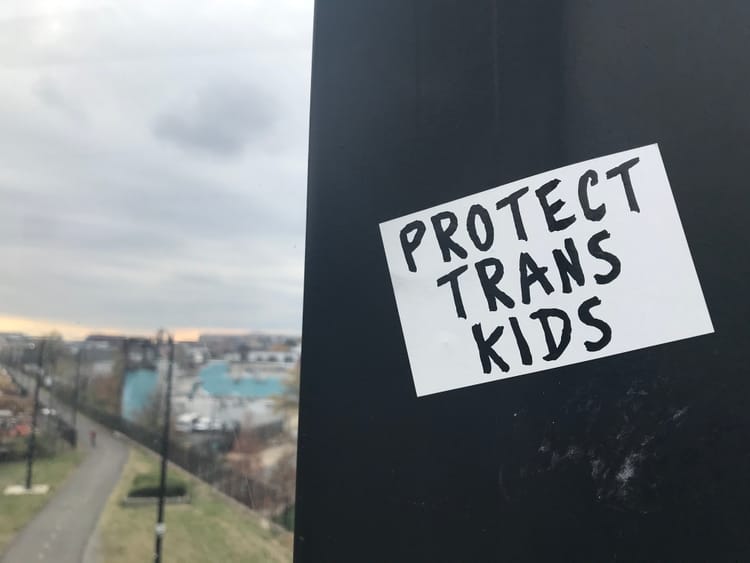Just the Pill Promised to Revolutionize Abortion Care Delivery. What Happened?

‘The people who handled money in our organization … were all nepotism hires’
Those who’ve followed my work for a while might remember this feature about mobile abortion clinics I wrote for Cosmopolitan, published in fall 2022.
In a dark and chaotic time full of very bad abortion news in the wake of the Supreme Court’s decision to overturn Roe v. Wade—to the point that many editors told me outright they didn’t want any more abortion stories because they were all too sad—an organization called Just the Pill seemed to offer a ray of sunshine: They were going to deploy a fleet of mobile abortion clinics in Colorado, which could drive right up to the borders of abortion ban states and make it easier for people there to cross into legal states for care. They hoped to expand from Colorado to every ban state border area in the country.
There were a lot of outlandish abortion care ideas in the immediate aftermath of the Supreme Court’s decision in Dobbs v. Jackson Women’s Health Organization. As I’ve reported previously, some were outright scams, and a lot of others just weren’t all that helpful. But if any of these wannabe innovators could pull their idea off, it seemed Just the Pill could.
As a reporter, being a skeptic is my job. But Just the Pill had hired a lot of experienced abortion care workers. And from what they told me, they had a lot of legal and logistical support in place to help get their idea off the ground.
Cut to January of this year, when Just the Pill abruptly laid off nearly three-quarters of its staff.
It’s a tough time; abortion clinics and funds are really struggling, and initially, I assumed that was the core of the issue. But then I started talking to former employees, who painted a picture of rampant nepotism and mismanagement at the organization.
What’s more, “Just the Pill has purposely misrepresented what we’ve done to the media,” one employee told me. And by the media, they meant… me.
Read more about what I learned really went on inside Just the Pill—and what it says about funding priorities in the reproductive rights and justice movements—in my story.
Trump stuff
There’s too much to summarize succinctly here, though my colleague Natasha Roy at Rewire News Group is writing very helpful weekly summaries of activities in Trumpland. Here is this week’s edition.
Sticking to my area of focus, this week’s biggest news points are that the Senate appears poised to confirm Robert F. Kennedy Jr. to be the Secretary of Health and Human Services. In addition to this being terrifying news because of RFK’s general anti-vaccine and anti-science views—and the fact that he stands to profit from some of his own regulatory decisions in the position—RFK also said in multiple confirmation hearings that he wants to “review the science” on one of the pills used in medication abortion, mifepristone.
The science is exceedingly clear: Mifepristone is safer than penicillin, Tylenol, Viagra, and a host of other common over-the-counter a prescription medications. The anti-abortion movement’s bid to portray mifepristone as dangerous is pure disinformation, and RFK is the perfect health secretary to validate it. During his confirmation hearings, RFK repeatedly said that he considers every abortion a tragedy and that he’ll “execute President Trump’s policies.” So, at the very least, expect new restrictions on medication abortion.
Trump also issued an executive order this week to “eradicate anti-Christian bias.” In it, he mentions his recent pardons of anti-abortion clinic invaders who violated the Freedom of Access to Clinic Entrances (FACE) Act. The order also suggests that there is a widespread pattern of attacks on Christian churches and “crisis pregnancy centers,” and that the Department of Justice wasn’t taking these seriously under Biden. In truth, the DOJ was applying the FACE Act in these (rare) cases.
The order also calls for the establishment of a government-wide task force dedicated to protecting Christians. During Trump’s first term, a similar task force led to the development of the anti-abortion Geneva Consensus Declaration, an international agreement the U.S. has already re-entered. More context on that in my recent story about the global gag rule.
Finally, this week the Department of Justice sent a letter to the Supreme Court saying, essentially, that the present administration would not have brought the case United States v. Skrmetti, and that it does not believe Tennessee’s ban on gender-affirming care for those under 18 discriminates on the basis of sex. (You can read my analysis of oral arguments in the case, about gender-affirming care and the dignity of risk, here.)
The original plaintiffs—families affected by the ban, represented by the American Civil Liberties Union—are still involved in the case and made their own arguments before the Supreme Court back in December, meaning that the lawsuit isn’t necessarily dead even if the Court allows the DOJ to back out. That said, this is a very unusual move considering that the case has already been argued and submitted, and there’s no telling exactly how the Court may respond.
I expect a similar move in United States v. Idaho, in which the Biden administration argued Idaho’s abortion ban violates the Emergency Medical Treatment and Active Labor Act (EMTALA). In preparation, St. Luke’s Health, a major Boise-area hospital, has filed its own lawsuit in at attempt to keep the case alive if and when the DOJ drops it.
Stay safe out there, y’all.
Repro Report will always be free, but to support my work, consider upgrading to a paid subscription.



